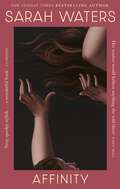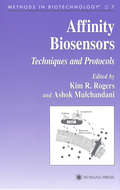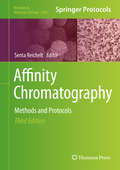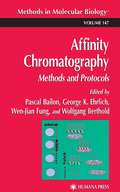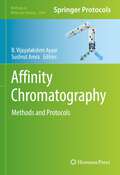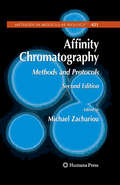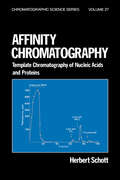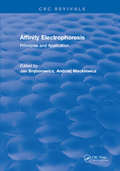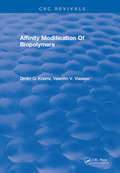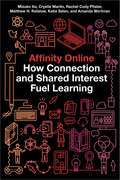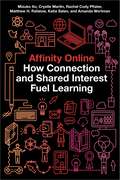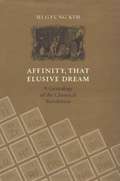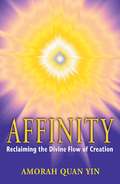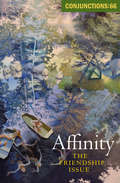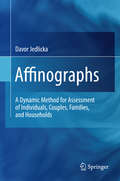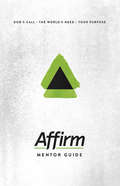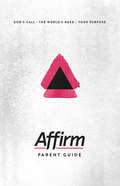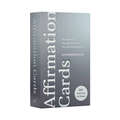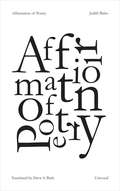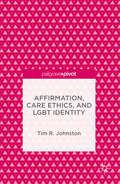- Table View
- List View
Affinity
by Sarah Waters'Affinity is the work of an intense and atmospheric imagination . . . Sarah Waters is such an interesting writer, a kind of feminist Dickens' Fiona Pitt-Kethley, Daily TelegraphSet in and around the women's prison at Milbank in the 1870s, Affinity is an eerie and utterly compelling ghost story, a complex and intriguing literary mystery and a poignant love story with an unexpected twist in the tale. Following the death of her father, Margaret Prior has decided to pursue some 'good work' with the lady criminals of one of London's most notorious gaols. Surrounded by prisoners, murderers and common thieves, Margaret feels herself drawn to one of the prisons more unlikely inmates - the imprisoned spiritualist - Selina Dawes. Sympathetic to the plight of this innocent-seeming girl, Margaret sees herself dispensing guidance and perhaps friendship on her visits, little expecting to find herself dabbling in a twilight world of seances, shadows, unruly spirits and unseemly passions.
Affinity
by Sarah WatersSet in and around the women's prison at Milbank in the 1870's , AFFINITY is an eerie and utterly compelling ghost story, a complex and intriguing literary mystery and a poignant love story with an unexpected twist in the tale. Following the death of her father, Margaret Prior has decided to pursue some 'good work' with the lady criminals of one of London's most notorious gaols. Surrounded by prisoners, murderers and common thieves, Margaret feels herself drawn to one of the prisons more unlikely inmates - the imprisoned spiritualist - Selina Dawes. Sympathetic to the plight of this innocent-seeming girl, Margaret sees herself dispensing guidance and perhaps friendship on her visits, little expecting to find herself dabbling in a twilight world of seances, shadows, unruly spirits and unseemly passions.
Affinity Biosensors: Techniques and Protocols (Methods in Biotechnology #7)
by Kim Rogers Ashok MulchandaniA cutting-edge collection of detailed, step-by-step techniques and protocols for constructing, evaluating, and using affinity-based biosensors. Ideal for novices starting research in their field or experienced researchers wanting to use a biosensor for a specific analytical measurement, the methods detailed here allow biochemists, analytical chemists, microbiologists, and engineers to successfully apply biosensor technology to their specific problems. The techniques include the use of antibodies and membrane receptors to construct optical, thermal, acoustic, and electrochemically based biosensors. Additional techniques involve antibodies, receptors, nucleic acids, liposomes, and eukaryotic cells. A companion volume, Enzyme and Microbial Biosensors: Protocols and Techniques, by Mulchandani & Rogers, concentrates on enzyme-biosensors.
Affinity Chromatography: Methods and Protocols (Methods in Molecular Biology #1286)
by Senta ReicheltThe aim of this edition is to introduce the beginner to the basics of affinity chromatography and provide practical knowledge for the development of affinity separation protocols. Affinity Chromatography: Methods and Protocols, Third Edition guides readers through new state of the art protocols, molecular modelling, and the study of ligand-target interactions. Written in the successful Methods in Molecular Biology series format, chapters include introductions to their respective topics, lists of the necessary materials and reagents, step-by-step, readily reproducible protocols, and notes on troubleshooting and avoiding known pitfalls. Authoritative and easily accessible, Affinity Chromatography: Methods and Protocols, Third Edition is designed as a useful resource for those interested in the rapid and quantitative isolation of biomolecules with high purity.
Affinity Chromatography: Methods and Protocols (Methods in Molecular Biology #147)
by Pascal BailonDetails powerful affinity chromatography methods, ranging from traditional affinity purification such as immunoaffinity chromatography, to the use of the latest phage-display technology in the discovery of affinity ligands and drugs. Also included are separations of small molecules such as haptens, protein ligands, and supramolecular structures. Each chapter is devoted to a specific technique and includes an introduction, an explanation of principles, a detailed materials list, and instructions. Practical notes suggest alternative procedures and describe how to overcome problems.
Affinity Chromatography: Methods and Protocols (Methods in Molecular Biology #2466)
by B. Vijayalakshmi Ayyar Sushrut AroraThis volume covers various aspects of affinity chromatography along with examples of its applications. Chapters guide readers through methodologies to purify a diverse array of molecular targets such as antibodies, extracellular vesicles, recombinant proteins, biomarkers, metabolites, plant organelles, nucleic acids, ligand identification and protocols on building affinity matrix. Written in the format of the highly successful Methods in Molecular Biology series, each chapter includes an introduction to the topic, lists necessary materials and reagents, includes tips on troubleshooting and known pitfalls, and step-by-step, readily reproducible protocols. Authoritative and cutting-edge, Affinity Chromatography: Methods and Protocols aims to be an invaluable resource to anyone employing affinity chromatography-based methodologies.
Affinity Chromatography: Methods and Protocols (Methods in Molecular Biology #421)
by Michael ZachariouThirty-eight years after its introduction, affinity chromatography remains a key tool in the armory of separation techniques available to separation and interaction scientists. Expanded and updated from the first edition, this second edition volume aims to provide the beginner with the practical knowledge needed to develop affinity separations suitable for a variety of applications relevant to the post-genomic era. It contains state-of-the-art, brand new protocols, and provides step-by-step laboratory instructions for readily reproducible results.
Affinity Chromatography: Template Chromatography of Nucleic Acids and Proteins
by Herbert SchottThis book informs the reader about the practical methods, possibilities, and limits of template chromatography. It shows the various techniques for immobilization of nucleic acids fragments, polynucleotides, and nucleic acids by which the desired separation of materials can be achieved.
Affinity Electrophoresis: Principles and Clinical Application
by Jan BreborowiczThis book discusses the topic of affinity electrophoresis (AFF-EP), which has become a useful tool for studies of biomolecular interactions. The book will discuss AFF-EP as an analytical method which has been used successfully for the diagnosis, differentiation, and monitoring of patients with various diseases. The book will also discuss other uses for the AFF-EP method.
Affinity Labs, Inc.
by Liz Kind Joseph B. LassiterIn November 2006, Chris Michel left Military.com, which he founded in 1999, to start Affinity Labs, a global network of online communities. That month, Michel raised a Series A round of venture funding and established a partnership with Monster, which he had sold Military.com to. Within its first year of operations, Affinity Labs launched eight vertical portals including PoliceLink, NursingLink, TechCommunity, and IndiaOn. While the company was well ahead of its original plan to release four portals in 2007, Michel still faced a number of challenges. He had learned a great deal from Military.com and Affinity Labs' first launches, but in the case of each new community was faced with how best to construct the vertical and attract a sufficiently large audience. While the model seemed highly scalable because each vertical used the same core technology, every sector had its unique features. In the fall of 2007, executives from Monster opened up a dialogue with Michel about selling the company or expanding their relationship. Michel wondered if the time was right to sell or if he should grow Affinity Labs further with the hope of creating a company that could command the high valuations seen recently by a number of social networking concerns.
Affinity Modification Of Biopolymers
by Dmitri G KnorreThe goal of this book is to give a systematic description of the main principles of affinity modification and applications, consideration of possibilities, and restrictions of the method. Modification within specific complexes is a special case of chemical modification which is widely used in the nonaddressed version in biochemistry and related areas. Therefore, we have included in the first introductory paper chapter of the book general considerations of chemical modifications of biopolymers and the application of biopolymers.
Affinity Online: How Connection and Shared Interest Fuel Learning (Connected Youth and Digital Futures #2)
by Katie Salen Mizuko Ito Crystle Martin Rachel Cody Pfister Matthew H. Rafalow Amanda WortmanHow online affinity networks expand learning and opportunity for young peopleBoyband One Direction fanfiction writers, gamers who solve math problems together, Harry Potter fans who knit for a cause. Across subcultures and geographies, young fans have found each other and formed community online, learning from one another along the way. From these and other in-depth case studies of online affinity networks, Affinity Online considers how young people have found new opportunities for expanded learning in the digital age. These cases reveal the shared characteristics and unique cultures and practices of different online affinity networks, and how they support “connected learning”—learning that brings together youth interests, social activity, and accomplishment in civic, academic, and career relevant arenas. Although involvement in online communities is an established fixture of growing up in the networked age, participation in these spaces show how young people are actively taking up new media for their own engaged learning and social development.While providing a wealth of positive examples for how the online world provides new opportunities for learning, the book also examines the ways in which these communities still reproduce inequalities based on gender, race, and socioeconomic status. The book concludes with a set of concrete suggestions for how the positive learning opportunities offered by online communities could be made available to more young people, at school and at home. Affinity Online explores how online practices and networks bridge the divide between in-school and out-of-school learning, finding that online affinity networks are creating new spaces of opportunity for realizing the ideals of connected learning.
Affinity Online: How Connection and Shared Interest Fuel Learning (Connected Youth and Digital Futures #2)
by Mizuko Ito Crystle Martin Rachel Cody Pfister Matthew H. Rafalow Katie Salen Amanda WortmanHow online affinity networks expand learning and opportunity for young peopleBoyband One Direction fanfiction writers, gamers who solve math problems together, Harry Potter fans who knit for a cause. Across subcultures and geographies, young fans have found each other and formed community online, learning from one another along the way. From these and other in-depth case studies of online affinity networks, Affinity Online considers how young people have found new opportunities for expanded learning in the digital age. These cases reveal the shared characteristics and unique cultures and practices of different online affinity networks, and how they support “connected learning”—learning that brings together youth interests, social activity, and accomplishment in civic, academic, and career relevant arenas. Although involvement in online communities is an established fixture of growing up in the networked age, participation in these spaces show how young people are actively taking up new media for their own engaged learning and social development.While providing a wealth of positive examples for how the online world provides new opportunities for learning, the book also examines the ways in which these communities still reproduce inequalities based on gender, race, and socioeconomic status. The book concludes with a set of concrete suggestions for how the positive learning opportunities offered by online communities could be made available to more young people, at school and at home. Affinity Online explores how online practices and networks bridge the divide between in-school and out-of-school learning, finding that online affinity networks are creating new spaces of opportunity for realizing the ideals of connected learning.
Affinity Plus (A)
by Peter Tufano Dennis CampbellThe executive team at Affinity Plus Federal Credit Union has pushed the concept of members first deeply throughout the organization, empowering employees to put member-owners' interests ahead of either the organization's interests or their own interests. As a result of this focus, the credit union must determine what to do with its profitable indirect auto lending business, which some see as inconsistent with the strategic direction set by the management team.
Affinity Plus: Priorities and Performance Pressures
by Dennis Campbell Kyle Thomas Tatiana SandinoCase
Affinity Plus: Priorities and Performance Pressures
by Dennis Campbell Kyle Thomas Tatiana SandinoCase
Affinity, That Elusive Dream: A Genealogy of the Chemical Revolution
by Mi Gyung KimMi Gyung Kim restores chemical affinity to its proper place in historiography and in Enlightenment public culture. The Chemical Revolution is usually associated with Antoine-Laurent Lavoisier, who introduced a modern nomenclature and a definitive text.
Affinity: Reclaiming the Divine Flow of Creation
by Amorah Quan YinAmorah Quan Yin's latest collection of channeled teachings on the nature of spiritual initiation, mystery schools, and how to access energies for personal transformation. • By the author of The Pleiadian Workbook (40,000 copies sold). • More than 25 recorded transmissions from Ascended Masters, St. Germain, Elohim, Mother Mary, and many others. • Includes guided meditations and exercises for everyday life. Learn how to live in divine flow, deepen your spiritual connection to the divine source, and access spiritual guidance in becoming a true Master Being of Light. In her latest series of channeled transmissions, Amorah Quan Yin provides a fascinating chronicle of human spiritual evolution from a galactic perspective. Quan Yin teaches that there is infinite loving assistance available to humanity from the higher dimensions. In Affinity she transmits the wisdom of the Ascended Masters, Angels, and others to assist us in learning how to receive this help and attain personal transformation. Drawing on the wisdom of Goddess Antares and the gentle support of the Dolphin Star Temple Higher Council, Quan Yin explains how to retune our bodies, minds, emotions, and spirits to the divine flow of the universe. Mother Mary teaches us how to remove ourselves from negative astral planes. From Elohim we learn how to work with our cellular structure on a spiritual plane. This extensive collection of teachings offers specific exercises and techniques to align us with our divine selves.
Affinity: The Friendship Issue (Conjunctions #66)
by Jonathan Carroll Joyce Carol Oates Rick Moody Robert Coover Jedediah Berry John Ashbery Robert Clark Elizabeth Gaffney Stephen O'Connor Robert Duncan Sallie Tisdale Matthew Cheney Elizabeth Robinson Tim Horvath Paul Lisicky Darcey Steinke Andrew Ervin Roberta Allen Brandon Hobson Charles B. Stozier Diane Josefowicz Emily Houk Gilles Tiberghien Isabella Hammad M. J. Rey Michelle Herman Spencer Matheson Rachel Blau DuPlessis J. W. McCormackNew writings on the topic of friendship from Stephen O&’Connor, Joyce Carol Oates, Robert Clark, Elizabeth Gaffney, Rick Moody and Darcey Steinke, and more. Aristotle proposed that a friend is, in essence, &“another self,&” and it is indisputable that our relationships with our friends are nearly as complex as the ones we have with ourselves: One minute we&’re in perfect accord, another we&’re uncertain. Friendships are as mercurial as they are essential. We form friendships that are fraught, friendships that fade, and friendships that are as important to us as our very lives.Conjunctions: 66, Affinity investigates the phenomenon of friendship in its many forms through innovative and provocative fiction, poetry, and essays by writers of every ilk.This collection includes contributions by Rick Moody and Darcey Steinke, Robert Coover, Rachel Blau DuPlessis, Elizabeth Gaffney, Andrew Ervin, Stephen O&’Connor, Gilles Tiberghien, Michelle Herman, Robert Clark, Jonathan Carroll, Sallie Tisdale, Robert Duncan, Jedediah Berry and Emily Houk, Diane Josefowicz, Brandon Hobson, Charles B. Strozier, Spencer Matheson, Paul Lisicky, John Ashbery, J. W. McCormack, Isabella Hammad, Tim Horvath, Roberta Allen, M. J. Rey, Elizabeth Robinson, Matthew Cheney, and Joyce Carol Oates.
Affinographs: A Dynamic Method for Assessment of Individuals, Couples, Families, and Households
by Davor JedlickaThe need for a new method for assessment and imaging of families, couples, and individuals has emerged in response to changes in family forms during the twentieth century. In the twentieth century divorce, remarriage, out-of wedlock child bearing, and alternate life styles have replaced monogamy as predominant form of marriage and the family. The methods of representation and assessment on the other hand remain based on the nineteenth century eugenics models embedded in the modern day genograms. This book is based on the premise that changes in family structure require changes in methods of representation, assessment, research, and teaching. This book introduces such a method in the form of a model named the affinograph. The affinograph provides a method which allows a greater respect for individuals, especially if their relationships contradict the preconceived institutional notions of marriage and the family. Improvement in visualizing families of various types and complexities can make affinographs an important new method that can bring together the theory, research, and application across varied disciplines that comprise family sciences.
Affirm Mentor Guide: God's Call/The World's Need/Your Purpose
by Jen Bradbury Sara Galyon Audrey Elizabeth WilderAffirm is a one-of-a-kind resource that aims to help teens take the next steps in following Jesus after making their initial commitment of faith.With the Affirm mentor guide, you will be equipped to be a trusted guide that helps students along this path. Being a disciple of Jesus can be incredible, but it can also be challenging. None of us can do it alone and we all need mentors along the way.
Affirm Parent Guide: God's Call/The World's Need/Your Purpose
by Jen Bradbury Sara Galyon Audrey Elizabeth WilderThe journey of faith is spectacular, full of wonder and discovery, but it is also challenging, filled with questions and doubt. This is doubly true for teens who navigate the journey of discovering their faith, while simultaneously discovering themselves. As teens change and grow, so does their faith.Affirm recognizes the difficulties and anxieties that emerge from raising a young person to be faithful. In response, the Affirm Parent Guide provides parents will the tools to be companions to their teens on this journey. As a parent, you’ll be invited to reflect on your own faith, so that you can help them as they learn about their own. The Affirm Parent Guide is full of helpful tips and activities to use as you both strive to grow in your faith and deepen your relationship with Christ.
Affirmation Cards: How We Heal through Self-Love, Joy, and Manifestation
by Alexandra ElleFrom bestselling self-care author Alexandra Elle, this empowering deck makes it easy to cultivate confidence, joy, and mindfulness in everyday life.Affirmation Cards is a deck of 55 cards, each featuring an uplifting affirmation on the front and a meditation practice on the back. Organized into six categories—Self-Love, Personal Power, Self-Trust, Letting Go, Boundaries, and Healing—these cards are designed to help you tap into moments of peace, clarity, and connection in your day-to-day life. Delivered in a luxe, take-anywhere package, this deck is a gorgeous accessory for wellness enthusiasts, meditators, and fans of Alexandra Elle.EXPERT WISDOM: Alexandra Elle is a leading voice in wellness and a New York Times bestselling author. Her work has been featured by a wide range of media outlets, including the New York Times, NPR, Good Morning America, Essence, MindBodyGreen, Forbes, among many others. This deck is inspired by the popular affirmations Alex shares with her fans online, offering readers bite-size practices that make it simple to incorporate positivity into daily life.EASY SELF-CARE: Brimming with 55 affirming practices, this deck makes it easy to incorporate profound self-care practices into busy days. The portable, on-the-go format makes it the ideal accessory to keep in your bag so that you can pull a card whenever you need a mindful moment.BEAUTIFUL TO GIFT AND DISPLAY: Delivered in a stylish, eye-catching package filled with 55 shimmering cards, Affirmation Cards is a beautiful gift for anyone interested in self-discovery, meditation, and mindfulness and a stylish companion for the spiritually curious.ENDLESS POSSIBILITIES: This interactive and uplifting deck can be used in a variety of ways: pull one card a day to start your morning with positivity, pull several cards at once to set an intention for the week, or keep a favorite card on the bedside table for everyday encouragement.Perfect for:• Fans of Alexandra Elle and her popular self-care publishing including How We Heal, After the Rain, and In Courage Journal• Meditators, yoga enthusiasts, and anyone interested in self-healing and personal development• Birthday, graduation, or wellness gift givers looking for gifts for for poets, writers, healers, caretakers, and all who can benefit from the power of positive thinking• Fans of Yung Pueblo, Rupi Kaur, Nedra Tawwab, and the Nap Ministry
Affirmation of Poetry (Univocal)
by Judith BalsoSince the times of Plato and Aristotle, the relation of poetry to philosophy has been controversial. For certain scholars, poetry should in no way be confused with philosophy. For others, poetry is at the heart of the possibility of thinking itself. In Affirmation of Poetry, Judith Balso defends the significance of poetry as a necessary practice for thinking. For Balso, if reading poetry properly has become an obscure task, poetry itself still carries with it a power of thinking: the efforts of the poets must continue. In analyzing the affirmation of thought found within the work of such poets as Osip Mandelstam, Wallace Stevens, Alberto Caeiro, and Giacomo Leopardi, Balso reestablishes poetry&’s place as a site of thought.
Affirmation, Care Ethics, and LGBT Identity
by Tim R. JohnstonIn this book, Johnston argues that affirmation is not only encouragement or support, but also the primary mechanism we use to form our identities and create safe spaces. Using the work of feminist care ethics and the thinking of French philosopher Henri Bergson to examine responses to school bullying and abuses faced by LGBT older adults, he provides the theoretical analysis and practical tools LGBT people and their allies need to make all spaces, public and private, spaces in which we can live openly as members of the LGBT community. With its combination of philosophical theory and on-the-ground activist experience, this text will be useful to anyone interested in philosophy, women's and gender studies, psychology, aging, geriatrics, and LGBT activism.
